
Lancet Planetary Health
Scope & Guideline
Transforming knowledge into action for planetary well-being.
Introduction
Aims and Scopes
- Interdisciplinary Research on Climate and Health:
The journal publishes research that explores the intersections of climate change and health, including the direct and indirect effects of climate-related changes on public health. - Sustainable Health Systems:
A core focus is on advancing sustainable health care systems, including strategies for reducing health care's environmental footprint and enhancing resilience to climate impacts. - Global Health Equity:
The journal emphasizes the importance of equitable health outcomes, addressing how environmental changes disproportionately affect marginalized populations and promoting policies that enhance health equity. - Impact of Environmental Factors on Health:
Research related to the impact of environmental factors such as air pollution, heat exposure, and biodiversity loss on various health outcomes is a significant area of focus. - Policy and Governance:
The journal encourages the exploration of policy frameworks and governance models that integrate health considerations into environmental and climate policies. - Community and Indigenous Knowledge:
It highlights the importance of community engagement and Indigenous knowledge in developing effective health and environmental interventions.
Trending and Emerging
- Mental Health and Climate Change:
An increasing number of articles are focusing on the mental health impacts of climate change, reflecting growing awareness of the psychological dimensions of environmental crises. - Nature-Based Solutions:
Research exploring the health benefits of nature-based solutions, such as urban greenspaces and biodiversity conservation, is trending, emphasizing their role in improving public health. - Food Systems and Health:
There is a noticeable rise in studies examining the connections between food systems, nutrition, and planetary health, particularly in relation to sustainable diets and food security. - Heat Adaptation Strategies:
Emerging research on heat adaptation strategies, especially in vulnerable populations, is gaining prominence in response to increasing global temperatures. - Intersectionality in Health Research:
The journal is increasingly highlighting the intersectionality of health issues, considering how factors such as gender, race, and socioeconomic status influence health outcomes in the context of environmental change. - Global Health Governance:
A trend towards exploring global health governance frameworks that integrate climate considerations is emerging, reflecting the need for coordinated international responses to health and environmental challenges.
Declining or Waning
- Traditional Public Health Approaches:
As the journal increasingly emphasizes planetary health, traditional public health approaches that do not consider environmental impacts are becoming less prevalent. - Narrowly Focused Disease Studies:
Research solely focused on specific diseases without considering broader environmental and social determinants is appearing less frequently, as there is a push towards more integrative health research. - Single-Sector Solutions:
Papers advocating for solutions that address health issues in isolation from environmental and social contexts are declining, as the journal promotes interdisciplinary approaches. - Limited Scope of Climate Change Impact Studies:
Studies that examine climate change impacts without a comprehensive view of health implications or mitigation strategies are becoming less common. - Static Policy Recommendations:
There is a waning interest in static policy recommendations that do not adapt to evolving understandings of climate and health interactions.
Similar Journals
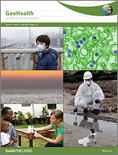
GeoHealth
Exploring the Vital Links Between Environment and Well-BeingGeoHealth is a premier open-access journal published by the American Geophysical Union, focusing on the intersection of environmental and health sciences. Launched in 2017, the journal has rapidly established itself with an impressive Q1 ranking in multiple categories, including Epidemiology, Global and Planetary Change, and Public Health, reflecting its commitment to high-quality research and impactful scholarship. Covering a broad spectrum of topics, GeoHealth provides a platform for scientific discussions on key issues such as health, environmental sustainability, pollution, and governance. With an accessible model, researchers and practitioners can freely share and access vital findings, significantly contributing to advancements in public health and environmental management. Exploring critical dimensions of health in relation to environmental changes, GeoHealth is essential reading for those seeking to understand and address contemporary challenges in health and environmental sectors.
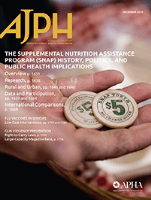
AMERICAN JOURNAL OF PUBLIC HEALTH
Exploring the forefront of public health and epidemiology.The American Journal of Public Health, published by the American Public Health Association, stands as a cornerstone in the field of public health and epidemiology since its inception in 1949. With its rigorous peer-review process and a robust commitment to advancing knowledge and research practices, this journal holds a prestigious position in the academic community, as reflected in its 2023 Scopus ranking, where it is placed in the top percentile (93rd) within the categories of Public Health and Environmental and Occupational Health. The journal's focus encompasses a broad spectrum of public health topics, making it essential reading for researchers, practitioners, and students dedicated to improving population health. Subscribers can access invaluable insights through its collection of innovative studies and reviews, thereby reinforcing the journal's role in shaping public health policy and practice. By bridging research and real-world application, the American Journal of Public Health remains a vital resource for those engaged in the quest to improve health outcomes across diverse communities.
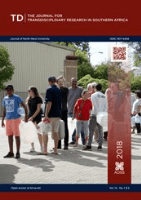
TD-The Journal for Transdisciplinary Research in Southern Africa
Inspiring impactful research for a sustainable future.TD-The Journal for Transdisciplinary Research in Southern Africa, published by AOSIS, is a pioneering academic journal dedicated to promoting interdisciplinary research across various fields in the Southern African region. With an Open Access model established in 2005, this journal ensures that valuable research is accessible to a wide audience, enhancing collaboration and knowledge sharing among researchers, professionals, and students. The journal’s commitment to transdisciplinary approaches reflects its objective to bridge the gap between theory and practice, fostering innovative solutions to complex societal challenges. Positioned as a vital resource in the academic community, TD-Journal encourages submissions that contribute to academic excellence and impactful research within Southern Africa and beyond. As a medium for fostering scholarly dialogue, it aims to inspire future generations of researchers to engage thoughtfully with pressing global issues.
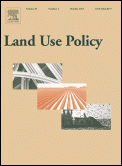
LAND USE POLICY
Empowering Policy Makers with Groundbreaking ResearchLAND USE POLICY, published by ELSEVIER SCI LTD, is a premier academic journal dedicated to advancing the study of land use issues and policies, with a particular focus on sustainable management and conservation practices. Since its inception in 1984, this journal has established itself as an influential platform in the fields of Forestry, Geography, Planning and Development, and Environmental Science, consistently achieving a Q1 category ranking across various disciplines. With an impressive impact factor and recognition as a top-tier source (e.g., ranking #18/821 in Geography and Planning), it serves as a critical resource for researchers, practitioners, and policy-makers looking to address complex land use challenges. Although it does not offer open access, the journal's articles are widely accessible through institutional subscriptions, enhancing its reach. Researchers and students can find valuable insights into innovative policies and methodologies that promote sustainable land management, making LAND USE POLICY essential reading for anyone engaged in environmental studies and policy development.
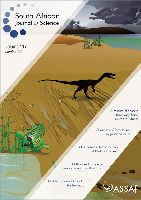
SOUTH AFRICAN JOURNAL OF SCIENCE
Fostering Collaboration Across Scientific LandscapesThe SOUTH AFRICAN JOURNAL OF SCIENCE, published by the Academy of Science of South Africa (ASSAf), is a prestigious open-access journal dedicated to the advancement and dissemination of scientific knowledge across various disciplines. Since its inception in 1973, the journal has played a pivotal role in fostering scientific communication within South Africa and beyond, ranking in the Q2 and Q3 quartiles across critical categories such as Agricultural and Biological Sciences, Biochemistry, Genetics and Molecular Biology, and Earth and Planetary Sciences as of 2023. With an ISSN of 0038-2353 and E-ISSN 1996-7489, this journal embraces modern publishing practices, having adopted an open-access model in 2009, which ensures that research is readily accessible to a global audience. The journal aims to promote interdisciplinary research and facilitate collaboration among scientists, making it an essential resource for researchers, professionals, and students eager to contribute to and learn from the dynamic landscape of scientific inquiry. For further information, collaborators and correspondents may reach out to the journal through its contact address: PO BOX 72135, LYNWOOD RIDGE 0040, SOUTH AFRICA.

Lancet Regional Health - Southeast Asia
Advancing Health Solutions for Southeast AsiaLancet Regional Health - Southeast Asia, published by ELSEVIER, stands as a pivotal open-access journal established in 2022, dedicated to advancing regional health discourse across Southeast Asia. With its ISSN 2772-3682, this journal endeavors to provide a platform for high-quality research and innovative solutions in key areas such as Infectious Diseases, Psychiatry and Mental Health, and Public Health, Environmental and Occupational Health. Recognized for its exceptional quality, it has achieved Q1 rankings in these pressing categories, reflecting its commitment to publishing impactful findings that resonate with both the academic community and practitioners alike. The journal is vowed to fostering open access, enhancing the reach and applicability of its content to aid policy-making and community health advancements in the region. By facilitating access to groundbreaking research, Lancet Regional Health - Southeast Asia plays an essential role in shaping public health narratives and promoting collaboration among researchers, students, and healthcare professionals.

Environmental Research Letters
Empowering voices in environmental science.Environmental Research Letters is a premier, peer-reviewed journal published by IOP Publishing Ltd based in the United Kingdom, dedicated to advancing the field of environmental science. With an impressive Impact Factor and consistently ranked in the Q1 category for its focus on Environmental Science, Public Health, and Renewable Energy, this open-access journal has been a vital resource for researchers and practitioners since its inception in 2006. Covering a wide scope of topics including sustainability, environmental health, and innovative energy solutions, ERL aims to promote discourse and disseminate groundbreaking research that addresses global environmental challenges. As a leader in the field, it holds prestigious positions in Scopus rankings, ensuring that published works reach a wide audience, thus driving impactful change. Researchers, professionals, and students alike will find valuable insights and essential knowledge within its pages, making it a keystone publication for anyone invested in environmental advancements.
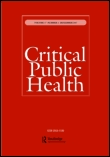
Critical Public Health
Advancing critical discourse in public health.Critical Public Health is a leading academic journal published by Routledge Journals, Taylor & Francis Ltd, dedicated to advancing the field of public health through rigorous research and critical engagement. Established with the aim of providing a platform for innovative and interdisciplinary scholarship, this journal has cemented its reputation within the Q1 category of Public Health, Environmental, and Occupational Health as of 2023. The journal spans a significant timeline from its inception in 1990 to the present, continuously addressing pressing health issues and the socio-environmental factors influencing public health globally. With an impressive Scopus rank of 144 out of 665 in its category, placing it within the 78th percentile, Critical Public Health serves as an essential resource for researchers, professionals, and students who aim to contribute meaningfully to public health discourse. Although currently not an open-access journal, its rich repository of articles facilitates the dissemination of important research findings, influencing public policy and health interventions worldwide. Based in the United Kingdom, the journal continues to foster a critical perspective on health and wellbeing amid evolving global challenges.

ACS Environmental Au
Fostering Innovation in Environmental StewardshipACS Environmental Au is a leading open-access journal published by the American Chemical Society (ACS), dedicated to advancing research in the environmental sciences. Since its inception in 2021, this journal has quickly established itself in the highly competitive landscape of environmental research, achieving Q1 status across multiple categories—Environmental Engineering, Environmental Science (Miscellaneous), and Water Science and Technology. With a strong Scopus ranking, including Rank #38 in Water Science and Technology representing the top 85th percentile, ACS Environmental Au serves as a vital platform for disseminating high-quality research and innovative solutions to pressing environmental challenges. It is particularly notable for its commitment to accessibility, providing researchers, professionals, and students with open access to critical findings that support sustainable development and environmental stewardship. This journal not only emphasizes rigorous scientific inquiry but also seeks to provoke thoughtful discourse and collaborative initiatives that address global environmental issues.

Regional Environmental Change
Bridging Science and Policy for a Greener FutureRegional Environmental Change, published by SPRINGER HEIDELBERG, is a leading journal dedicated to the critical field of Environmental Science, specifically focusing on the global and planetary changes affecting our regional environments. Since its inception in 2005 and continuing through 2024, the journal has been a pivotal platform for disseminating cutting-edge research, insights, and methodologies that address pressing environmental issues. With an impressive Scopus rank, placing it in the top 30% of journals in its category, Regional Environmental Change (ISSN: 1436-3798; E-ISSN: 1436-378X) showcases high-quality academic articles that engage with the multifaceted impacts of environmental shifts, providing researchers, professionals, and students with vital knowledge and data. Although the journal does not currently offer Open Access, it remains a crucial resource for those committed to understanding and mitigating the effects of environmental change on regional ecosystems and communities.